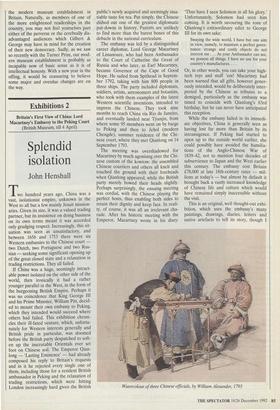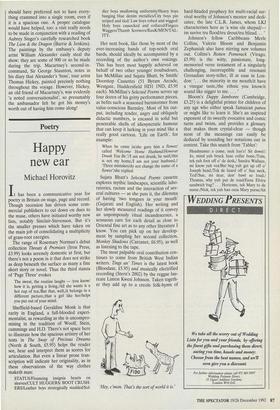Exhibitions 2
Britain's First View of China: Lord Macartney's Embassy to the Peking Court (British Museum, till 4 April)
Splendid isolation
John Henshall
Two hundred years ago, China was a vast, isolationist empire, unknown in the West to all but a few mainly Jesuit mission- aries. Given its size, it was a valued trading partner, but its insistence on doing business on its own terms meant it was accorded only grudging respect. Increasingly, this sit- uation was seen as unsatisfactory, and between 1656 and 1753 there were six Western embassies to the Chinese court — two Dutch, two Portuguese and two Rus- sian — seeking some significant opening up of the great closed state and a relaxation in trading restrictions. They all failed.
If China was a huge, seemingly intract- able power isolated on the other side of the world, then ironically it had a rather younger parallel in the West, in the form of the burgeoning British Empire. Perhaps it was no coincidence that King George III and his Prime Minister, William Pitt, decid- ed to mount their own embassy to Peking, which they intended would succeed where others had failed. This exhibition chroni- cles their ill-fated venture, which, unfortu- nately for Western interests generally and British pride in particular, was doomed before the British party despatched to soft- en up the inscrutable Orientals ever set foot on Chinese soil. The Emperor Qian- long — 'Lasting Eminence' — had already composed his reply to Britain's requests and in it he rejected every single one of them, including those for a resident British ambassador in Peking and the relaxation of trading restrictions, which were hitting London increasingly hard given the British public's newly acquired and seemingly insa- tiable taste for tea. Put simply, the Chinese dished out one of the greatest diplomatic put-downs in history. Parents are unlikely to find more than the barest bones of this debacle in the national curriculum.
The embassy was led by a distinguished career diplomat, Lord George Macartney of Lissanoure, who had been Ambassador to the Court of Catherine the Great of Russia and who later, as Earl Macartney, became Governor of the Cape of Good Hope. He sailed from Spithead in Septem- ber 1792, taking with him 800 people in three ships. The party included diplomats, soldiers, artists, astronomers and botanists, who took with them examples of the latest Western scientific inventions, intended to impress the Chinese. They took nine months to reach China via Rio de Janeiro, and eventually landed near Tjianjin, from where some 95 members went on by barge to Peking and then to Jehol (modern Chengde), summer residence of the Chi- nese court, where they met Qianlong on 14 September 1793.
The meeting was overshadowed for Macartney by much agonising over the Chi- nese custom of the kowtow: the assembled Chinese courtiers and others all knelt and touched the ground with their foreheads when Qianlong appeared, while the British party merely bowed their heads slightly. Perhaps surprisingly, the ensuing meeting was cordial, with the Chinese playing the perfect hosts, thus enabling both sides to retain their dignity and keep face. In reali- ty, of course, it was all an irrelevant cha- rade. After his historic meeting with the Emperor, Macartney wrote in his diary: 'Thus have I seen Solomon in all his glory.' Unfortunately, Solomon had seen him coming. It is worth savouring the tone of Qianlong's extraordinary edict to George III for its own sake: Swaying the wide world, I have but one aim in view, namely, to maintain a perfect gover- nance: strange and costly objects do not interest me ... As your Ambassador can see, we possess all things. I have no use for your country's manufactures....
Or, in other words, you can take your high- tech toys and stuff 'em! Macartney had been warned that all gifts, however gener- ously intended, would be deliberately inter- preted by the Chinese as tributes to a demigod, particularly as the embassy was timed to coincide with Qianlong's 83rd birthday, but he can never have anticipated this reception.
While the embassy failed in its immedi- ate objectives, China is generally seen as having lost far more than Britain by its intransigence. If Peking had started to open up to the outside world earlier, she could possibly have avoided the humilia- tions of the Anglo-Chinese War of 1839-42, not to mention four decades of subservience to Japan and the West earlier this century. The embassy cost Britain £78,000 at late 18th-century rates — mil- lions at today's — but almost by default it brought back a vastly increased knowledge of Chinese life and culture which would have remained simply inaccessible without the visit.
This is an original, well thought-out exhi- bition, which uses the embassy's many paintings, drawings, diaries, letters and native artefacts to tell its story, though I Watercolour of three Chinese officials, by William Alexander, 1793 should have preferred not to have every- thing crammed into a single room, even if it is a spacious one. A proper catalogue would have helped, too: a visit really needs to be made in conjunction with a reading of Aubrey Singer's carefully researched book The Lion & the Dragon (Barrie & Jenkins). The paintings by the embassy's deputy artist William Alexander easily steal the show: they are some of 900 or so he made during the trip. Macartney's second-in- command, Sir George Staunton, notes in his diary that Alexander's 'boss', tour artist Thomas Hickey, painted precisely nothing throughout the voyage. However, Hickey, an old friend of Macartney's, was evidently 'a noted conversationalist', so presumably the ambassador felt he got his money's worth out of having him come along!











































































































 Previous page
Previous page